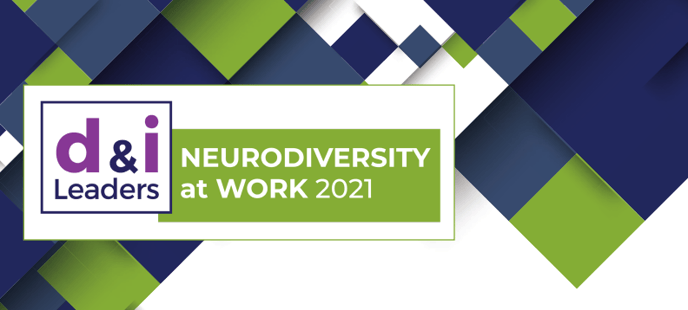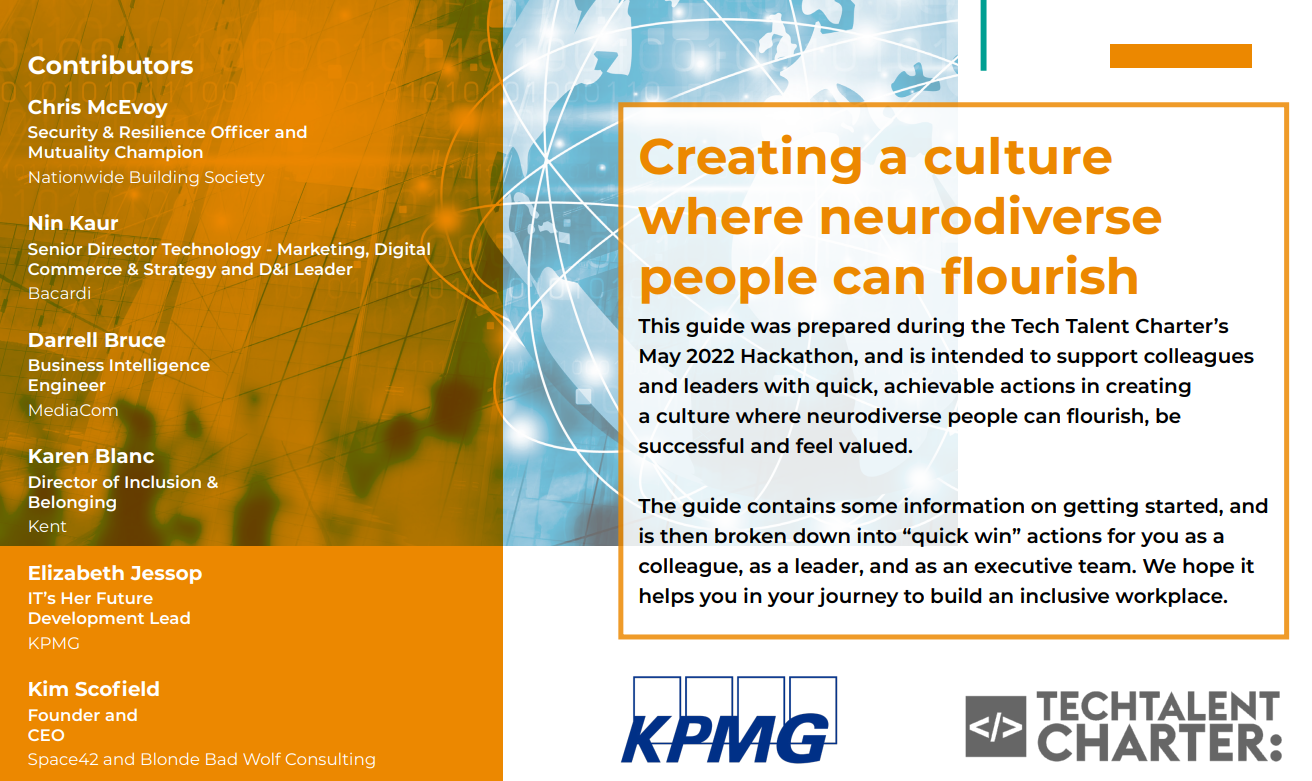To drive business growth, organisations need employees with creativity and innovation skills. Neurodivergent employees think differently from their peers, and their unique perspectives can contribute to solving problems in innovative ways.
Employer recommendations
Recruitment
➖Make job advertisements simple and accurate. Remove jargon and use plain, easy-to-read English, focusing on essential skills and experiences, and avoiding unnecessary information.
Avoid using subjective terms like 'enthusiastic', and 'energetic' as these can be difficult to quantify, it’s good practice to use words that focus on role-specific tasks and competencies in job adverts and descriptions.
Refrain from including any years of experience requirements in job adverts, as to include any years of experience in a job advert or job description contravenes the Equality Act 2010 in GB and Employment Equality (Age) Regulations (Northern Ireland) 2006 in NI.
➖To further enhance the interview experience for neurodiverse candidates, recruiters can consider implementing the following strategies:
- Provide candidates with a clear agenda beforehand, including who they will be interviewing with, the dress code, how long the interview will last, and what sort of questions to expect.
- Provide candidates with additional resources to help them prepare for the interview. This could include sample questions or a list of common interview topics. By providing candidates with these resources, you can help them feel more confident and prepared for the interview process.
- Give candidates the option to have their video on or off for the first call. For some neurodivergent individuals, video calls can be overwhelming due to the sensory overload caused by the video screen. For others, facial cues and body language help them better understand the tone of an interview. Giving candidates the option will create a safer and more comfortable environment for everyone.
- Consider using alternative forms of assessment. Not all neurodivergent individuals will excel at traditional interviews, and alternative forms of assessment can be helpful in identifying their strengths. For example, a take-home assessment could be a better way to assess a neurodivergent candidate's skills and abilities, in comparison to a live problem-solving exercise.
- Ask interview questions in a clear way and unambiguous manner and leave space for silence. Don't be afraid to rephrase a question if necessary, and encourage candidates to take their time to answer questions.
- Offer interview accommodations early on to show inclusivity and support as you're scheduling the interview.
- At the end of the interview, clearly outline the next steps to provide transparency and reassurance, and leave plenty of room for questions.
➖Ask applicants what they need and adjust your interview/assessment process.
Adjust the interview process to better fit the needs of neurodiverse applicants who may, for example, struggle to concentrate or hold eye contact (read more about this in An Intersectional Approach to Inclusion at Work, HBR.).
The use of Skype interviews, the avoidance of hypothetical questions, and carrying out trials working from home are all useful and effective ways to support neurodiverse candidates through the recruitment process. Many accommodations also have a spillover effect, and can benefit other candidates too. For example, if the interview is in person, providing a quiet room for an interview can also benefit candidates who are neurodiverse or have anxiety. Additionally, offering breaks during interviews can benefit all candidates, as it can help them to stay focused and engaged.
➖Use the Autism @ Work Playbook designed by Microsoft, EY, SAP and JP Morgan for more recommendations on recruiting & sourcing neurodiverse talent and interviewing and selecting candidates with neurodiversity.
➖Promote the organisation’s interest in and support for candidates with neurodiversity.
➖Consider using non-traditional, non interview-based assessment mechanisms. 'Traditional interviews often screen out autistic people who may be ‘prone to conversational tangents, and can be overly honest about their weaknesses’. And managers find it hard to envisage how established working practices may be adjusted for neurodiverse applicants', 'How to attract and retain neurodiverse candidates for your workforce', Ash Sharma, Training Journal, 2019. For task-orientated jobs, like coding, it’s better to have a task-oriented interview, where applicants are given a task to perform, demonstrating how they will actually do the work itself, rather than how they can answer questions.
🔦Microsoft focus on candidates’ social skills which is done over several days. Their process is part interview, part workshop, 'Opening Doors: Implementing a Neurodivergent Friendly Recruitment Process', Inhouserecruitment.co.uk.
➖Consider setting targets for hiring neurodivergent talent, developed in consultation with legal counsel. Involve neurodivergent team members in the process.
➖Elicit feedback from candidates and employees to improve your interview and selection process.
Onboarding, physical environment and organisational policy
➖Provide information on the work environment well before a person's first day. If the person will be working on-site, you can also invite them in so they can see what the office is like on a busy day. This will help them to identify any adjustments that they may need, such as: if any furniture needs to be moved, any new equipment for their desk, and any reasonable adjustments they need before their first day.
➖Identify the support circle for the new hire and provide these details to the new joiner.
➖Ask and understand individual challenges and strengths. Treat each neurodivergent employee as an individual - aim to develop people manager's awareness of the variety of ways neurodiversity may present even within a single type. It is important to let neurodivergent employees tell you their strengths and needs rather than assuming.
➖Frame organisational policies to support neurodiversity.
➖Pay attention to the physical environment. Some neurodivergent people can be sensitive to noise and light, so provide adjustable lighting and screen partitions or set aside quiet, less brightly lit areas for these employees to use. Some people may find quiet environments distracting. The use of noise cancelling headphones or enabling homeworking can also be
helpful to those that are sensitive to their environment.
➖Create a jargon handbook and specify unspoken rules that some neurodivergent workers might otherwise miss. 'Clear organisational communication is essential for autistic people, who are often excluded by the reliance on hidden messages, corporate doublespeak, and “insider” expressions with obscured meaning. Cultures that lack transparency in procedures and decision making present success barriers for autistic people and others. Transparency, on the other hand, supports both inclusion and productivity, promotes a sense of psychological safety, and drives organisational performance', An Intersectional Approach to Inclusion at Work, HBR, 2022.
Performance management and development
➖Identify skills gaps and implement initiatives to close these.
➖Provide training and support to raise awareness of neurodiversity with potential managers of neurodivergent talent, their teams and the employee population more generally. Neurodivergent employees should be included in the design of this training so they can comment, validate or correct the guidance the organisation provides.
➖Closely monitor changes in performance.
➖Provide regular check-ins and mentorship opportunities.
➖Do not predefine what success/growth should look like. Growth and career path mean different things to different people. While some may aspire to ascend to higher levels (e.g., some of the directors we interviewed), for others, success might mean being in a role they like; not everyone wants to become a leader in a traditional hierarchy. Some may prefer to work in teams, others may prefer to work alone. Thus, to ensure success in a role, it is important for organisations to deliberate on tailored career paths that recognise the goals, capabilities, and strengths of the individual.
➖Offer new roles in the capacity of mentor/coach. As neurodivergent professionals become experienced in their roles, they could evolve as mentors or coaches and pay it forward to other neurodivergent professionals in the organisation. Eventually, this pool could become a strong network where professionals not only feel like they belong but are able to leverage each other’s experiences.
➖Set stretching goals and projects with adequate support.
➖Involve neurodiverse employees in key project teams.
➖Train for growth by asking employees what they want/need.
➖ 'Create a culture that offers, encourages and accepts both flexibility and inflexibility', A rising tide lifts all boats, Deloitte, 2022.
During Tech Talent Charter's May 2022 DE&I Hackathon, subject matter experts co-designed a new employer product on creating a culture where neurodiverse people can flourish. The theme was sponsored by signatories KPMG.
Organisations supporting neurodiversity at work
- Genius Within
- Do It
- Lexxic
- Diversity and Ability.com
- Auticon
- Aubilities
- Kimel Foundation
- Neurodiversity in Business
Further information
- Strategy: what Deloitte is doing to become a neurodiversity employer of choice
- Book: Unmasked, The Ultimate Guide to ADHD, Autism and Neurodivergence
- Guide: Neurodiversity Inclusive Hiring Checklist
- Guide: Championing Neurodiversity in the Workplace, Rowe IT
- Guide: Best practices on becoming a Neurodiverse employer, auticon
- Video: TTC Working Lunch with auticon: Neurodivergence in the workplace
- Slides: TTC Working Lunch - Neurodivergence in the workplace, auticon
- Guide: Unlocking the Potential of Neurodivergent Talent, Gartner [subscription required]
- HR guide: How To Be More Neuro-Inclusive In The Workplace, everymind at work
- Article: IT hiring targets the talent of the neurodiverse community, CIO
- Report: Digital, Data and Technology Recruitment: Neurodiversity Review, The Scottish Government
- Article: An Intersectional Approach to Inclusion at Work, Harvard Business Review
- Toolkit: Transition to employment, Ambitious about autism
- Article: A rising tide lifts all boats, Deloitte
- Guide: Implementing a Recruitment Process for Neurodiversity, Inhouse recruitment
- Guide: Neurodiversity in the workplace, Aviva
- Blog: 12 Tips for supporting employees with ADHD, Texthelp
- Guide: Neurodiversity at Work Guide, CIPD
- Signatory Spotlight: Hiring more neurodiverse people, Scottish Government


